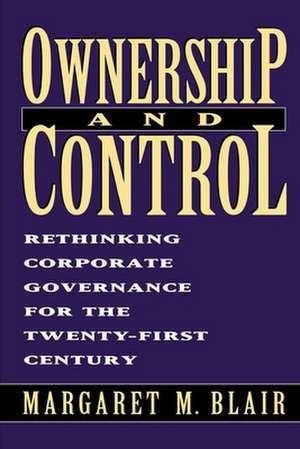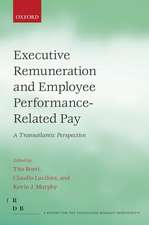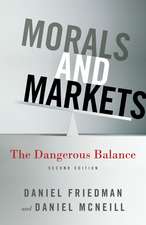Ownership and Control: Rethinking Corporate Governance for the Twenty-First Century
Autor Margaret M. Blairen Limba Engleză Paperback – iun 1995
Who should be allowed to call the shots in the boardrooms of U. S. Corporations? And what difference does it make for their growth and profitability? In the last decade, these issues have moved to the center of policy debates about the time horizons and competitiveness of U.S. companies. This book is an indispensable guide through the historical, legal, and institutional background for these corporate governance debates. It explains three broad views on the relationship among the governance, performance, and competitiveness of corporations, and examines the intellectual history, politics, and empirical evidence behind each argument. It also considers the effect that two trends will have on corporate governance: the growth and power of public employees' pension funds and the increase in the economic activity that comes from specialized services and customized production.
Blair asserts that companies need to experiment with different governance arrangements, such as choosing directors to represent particular constituencies, or making more radical arrangements like leveraged buyouts or worker-owned companies. Public policy should encourage, or at least not impede, such experimentation.
Blair asserts that companies need to experiment with different governance arrangements, such as choosing directors to represent particular constituencies, or making more radical arrangements like leveraged buyouts or worker-owned companies. Public policy should encourage, or at least not impede, such experimentation.
Preț: 238.42 lei
Nou
Puncte Express: 358
Preț estimativ în valută:
45.63€ • 47.27$ • 38.08£
45.63€ • 47.27$ • 38.08£
Carte tipărită la comandă
Livrare economică 21 martie-04 aprilie
Preluare comenzi: 021 569.72.76
Specificații
ISBN-13: 9780815709473
ISBN-10: 0815709471
Pagini: 388
Ilustrații: Illustrations
Dimensiuni: 152 x 229 x 25 mm
Greutate: 0.58 kg
Ediția:New.
Editura: Brookings Institution Press
Colecția Brookings Institution Press
ISBN-10: 0815709471
Pagini: 388
Ilustrații: Illustrations
Dimensiuni: 152 x 229 x 25 mm
Greutate: 0.58 kg
Ediția:New.
Editura: Brookings Institution Press
Colecția Brookings Institution Press
Notă biografică
Margaret M. Blair is a senior fellow in Economic Studies at the Brookings Institution and author of Ownership and Control: Rethinking Corporate Governance for the Twenty-first Century (Brookings, 1995).
Descriere
Who should be allowed to call the shots in the boardrooms of U. S. Corporations? And what difference does it make for their growth and profitability? In the last decade, these issues have moved to the center of policy debates about the time horizons and competitiveness of U.S. companies. This book is an indispensable guide through the historical, legal, and institutional background for these corporate governance debates. It explains three broad views on the relationship among the governance, performance, and competitiveness of corporations, and examines the intellectual history, politics, and empirical evidence behind each argument. It also considers the effect that two trends will have on corporate governance: the growth and power of public employees' pension funds and the increase in the economic activity that comes from specialized services and customized production.
Blair asserts that companies need to experiment with different governance arrangements, such as choosing directors to represent particular constituencies, or making more radical arrangements like leveraged buyouts or worker-owned companies. Public policy should encourage, or at least not impede, such experimentation.
Blair asserts that companies need to experiment with different governance arrangements, such as choosing directors to represent particular constituencies, or making more radical arrangements like leveraged buyouts or worker-owned companies. Public policy should encourage, or at least not impede, such experimentation.













